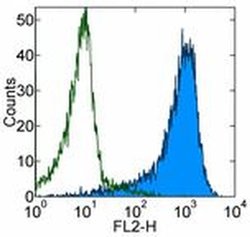Learn More
Invitrogen™ CD1b Monoclonal Antibody (eBioSN13 (SN13 K5-1B8)), eBioscience™
Mouse Monoclonal Antibody
Supplier: Invitrogen™ 14001882

Description
Description: The eBioSN13 monoclonal antibody reacts with human CD1b. The CD1 molecules are similar to MHC class I, but rather than presenting peptide antigens to T-cell receptors (TCR), they present a diversity of lipid and glycolipid antigens which are derived from self as well as from mycobacteria which include sphingolipids, mycolic acid derivatives and phosphatidylinositols such as liparabinomannan (LAM) and glucose monomycolate (GMM). CD1b is 45 kDa, and like the other CD1 antigens, is expressed as a heterodimer composed of the CD1b noncovalently paired with beta2-microglobulin. Applications Reported: This eBioSN13 (SN13 K5-1B8) antibody has been reported for use in flow cytometric analysis, immunoprecipitation, and immunohistology staining of frozen tissue sections. Applications Tested: This eBioSN13 (SN13 K5-1B8) antibody has been tested by flow cytometric analysis of SN13 cells. This can be used at less than or equal to 1 μg per test. A test is defined as the amount (μg) of antibody that will stain a cell sample in a final volume of 100 μL. Cell number should be determined empirically but can range from 10^5 to 10^8 cells/test. It is recommended that the antibody be carefully titrated for optimal performance in the assay of interest. Purity: Greater than 90%, as determined by SDS-PAGE. Aggregation: Less than 10%, as determined by HPLC. Filtration: 0.2 μm post-manufacturing filtered.
This gene encodes a member of the CD1 family of transmembrane glycoproteins, which are structurally related to the major histocompatibility complex (MHC) proteins and form heterodimers with beta-2-microglobulin. The CD1 proteins mediate the presentation of primarily lipid and glycolipid antigens of self or microbial origin to T cells. The human genome contains five CD1 family genes organized in a cluster on chromosome 1. The CD1 family members are thought to differ in their cellular localization and specificity for particular lipid ligands. The protein encoded by this gene localizes to late endosomes and lysosomes via a tyrosine-based motif in the cytoplasmic tail, and requires vesicular acidification to bind lipid antigens.
Specifications
| CD1b | |
| Monoclonal | |
| 0.5 mg/mL | |
| PBS with 0.09% sodium azide; pH 7.2 | |
| P29016 | |
| CD1B | |
| Affinity chromatography | |
| RUO | |
| 910 | |
| 4°C | |
| Liquid |
| Flow Cytometry, Immunohistochemistry (Frozen), Immunoprecipitation | |
| eBioSN13 (SN13 K5-1B8) | |
| Unconjugated | |
| CD1B | |
| Antigen-presenting glycoprotein CD1d2; BDCA1; CD1; CD1.2; CD1A; CD1b; CD1B antigen, b polypeptide; CD1b molecule; CD1C antigen; CD1d.2; Cd1d2; CD1d2 antigen; cortical thymocyte antigen CD1B; differentiation antigen CD1-alpha-3; Ly-38; MGC125990; MGC125991; R1; RP11-101J8.3; RP11-101J8.4; T-cell surface glycoprotein CD1b; T-cell surface glycoprotein CD1d2 | |
| Mouse | |
| 100 μg | |
| Primary | |
| Human | |
| Antibody | |
| IgG1 |
The Fisher Scientific Encompass Program offers items which are not part of our distribution portfolio. These products typically do not have pictures or detailed descriptions. However, we are committed to improving your shopping experience. Please use the form below to provide feedback related to the content on this product.
